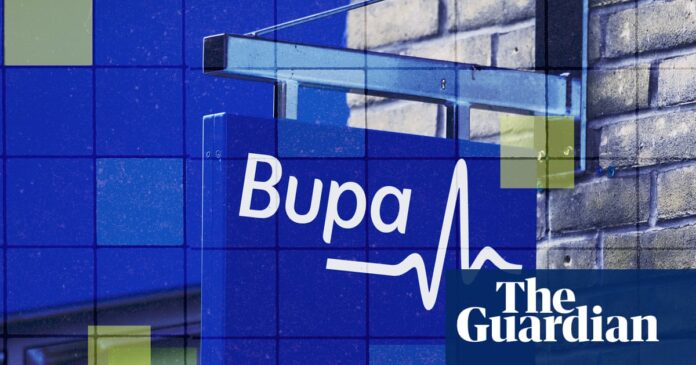More than $14m in bonuses was awarded to senior Australian health insurance staff at Bupa little more than a year before the company admitted to unconscionably causing customers to cancel or delay medical procedures.
The bonuses, for more than 20 staff in 2023-24, came after the insurer had engaged in “misleading and deceptive conduct” between May 2018 and August 2023. This affected more than 7,500 customers, leaving many out of pocket for procedures they were entitled to claim.
Bupa admitted to the misconduct in June 2025 and reached an agreement with the Australian Competition and Consumer Commission (ACCC) to pay a $35m fine. The $14.1m bonuses is the equivalent of 40% of the proposed fine.
The federal court has yet to decide whether the fine is appropriate.
Bupa concedes it misled thousands of members to wrongly believe they did not have insurance for certain medical treatments during the five-year period. According to the ACCC, some customers upgraded their insurance when they did not need to.
When the proposed $35m fine was first announced, Bupa’s chief executive, Nick Stone, said “we are deeply sorry for failing to get things right for our customers and are saddened by the impact this has had on them and their families. This should never have happened”.
The ACCC said at the time that some Bupa customers “delayed, cancelled or went without treatment for which they were, at least partially, covered under their health insurance policies”.
A document outlining Bupa’s undertaking to the ACCC shows that the insurer voluntarily implemented a “remediation program” to address harm caused in 2021, three years before the bonuses were paid. The document also shows Bupa had cooperated with the ACCC’s investigation for four years before it was eventually taken to court.
Sign up: AU Breaking News email
As at 30 June, the insurer had so far paid $14.3m in compensation to people affected by 4,100 wrongly assessed claims.
Corporate disclosures reveal Bupa’s health insurance executives had, by that time, already been awarded millions of dollars for the company’s “strong improvements in both business outcomes and customer experience”.
Bupa’s bonuses are just one example of bonuses being awarded to top staff, despite community outrage and regulatory sanctions over their company’s actions.
Qantas is facing pressure to curtail generous bonuses after the federal court found it illegally sacked 1,800 workers. So too is childcare giant G8 Education, whose chief executive secured a short-term bonus of $534,426 last year, despite multiple safety breaches and the employment of a man subsequently charged with multiple child sexual offences.
Corporate law expert Helen Bird, a senior lecturer at Swinburne university, said bonuses were key to determining the culture of an organisation and what behaviours are considered acceptable.
“If you want to know how a company is really governed, then you’ve got to understand how it rewards its executives,” Bird said.
Multimillion-dollar bonuses ‘send the wrong message’
During the 2023-24 financial year, one senior Bupa employee was awarded an annual bonus of $2.5m, with payment of $2m deferred until a later year. The bonus was more than double the position’s $1.1m salary.
Another 19 managers shared in bonuses totalling $11.6m, with $5.5m of that deferred to later years.
The bonuses have been condemned by the Consumer Health Forum of Australia’s chief executive, Dr Elizabeth Deveny, who said “it’s pretty hard to believe these executive bonuses are in line with community expectations”.
“When a company has breached consumer trust, multimillion-dollar executive bonuses send the wrong message,” Deveny said. “It reinforces the perception that profits come before people.
“I imagine there are a lot of people who had their claims incorrectly denied who are scratching their heads asking themselves why these bonuses were deserved.”
A Bupa spokesperson repeated the insurer’s apology and said the breaches were “not the result of any one individual’s actions or decisions, rather they were caused by cumulative failures in our systems, processes and in the training of our people”.
“A significant part of total executive remuneration is based on criteria that is strictly linked to how the business performs,” the spokesperson said.
Bupa also indicated bonuses were cut in response to the ACCC’s action. It is not known whether this included clawback provisions for the deferred bonus payments.
Many of the employees subject to the ACCC proceedings no longer work at Bupa.
“In line with our approach to executive remuneration and accountability framework, we’ve taken appropriate action in response to these issues,” the spokesperson said.
“This includes disciplinary steps and/or financial penalties where appropriate.”
Until 2024, companies like Bupa were not required to disclose executive bonuses. The Australian Prudential Regulation Authority introduced a mandatory disclosure regime to “shine additional light on how executives are incentivised and on the consequences for poorly managed risk”.
The Australian Medical Association’s president, Dr Danielle McMullen, did not criticised Bupa directly but said she remained concerned about executive pay at the expense of patient outcomes.
Disclaimer : This story is auto aggregated by a computer programme and has not been created or edited by DOWNTHENEWS. Publisher: theguardian.com









